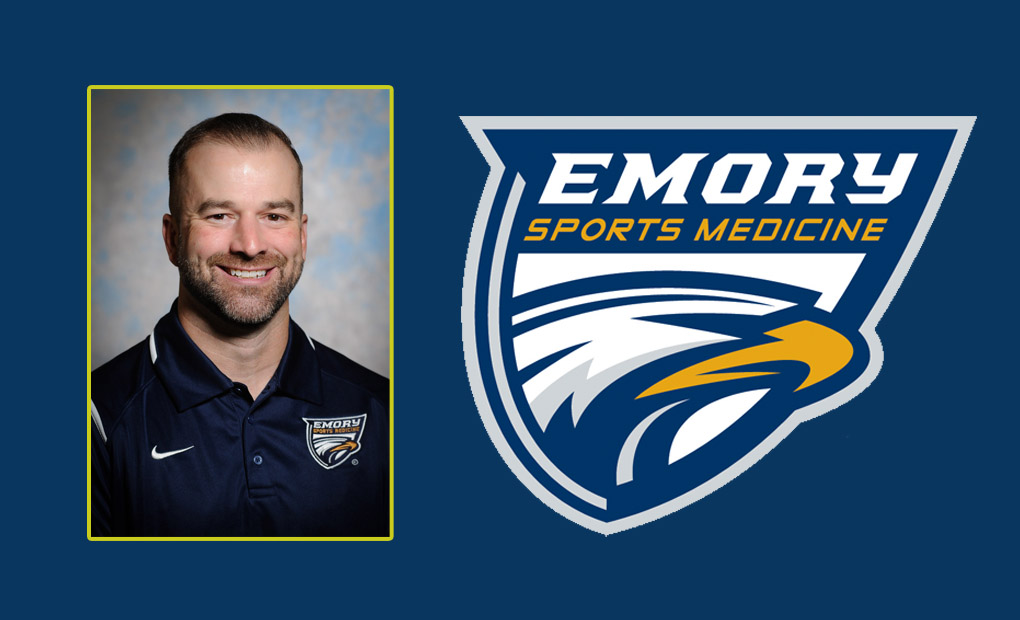With March being National Athletic Training Awareness Month, Emory Athletics would like to highlight several members of the Sports Medicine staff. The spotlight series continues with Jake Forker, who joined the Emory staff in June of 2018. During the COVID pandemic, he has been assisting with the University’s contact tracing program.
** What inspired you to become an athletic trainer?
I probably have the same story as a lot of athletic trainers. Back in Texas, I was tennis player in high school. I had to see the athletic trainer there for what’s called Osgood schlatter’s in my knees. In Texas, it’s true what they say, football is king, but athletic trainer there at the time, Eddy McGuire took care of me and made me feel like my injury was just as important as anyone else’s. Growing up I had wanted to go to Texas A&M to become a veterinarian. After meeting Eddy (and the fact he was an Aggie too), I quickly realized that athletic training could both satisfy my need to be a helper and my personality of working in a dynamic, close knit environment. He became my first mentor and really set me on the path I’m currently on today!
** What is the one thing you enjoy the most about your role?
I absolutely love developing meaningful relationships with the people I work with and those I serve. Athletic training is different from any other medical profession in that the amount of time you spend with colleagues, coaches and athletes and the shared experiences lends itself to creating lifelong bonds. I’m also really fortunate now to be in a position to be able to bring my two sons, Jakey and Johnny around so they can experience all the good things that come with being around the different teams and the people here at Emory – that is definitely a unique and priceless experience for them!
** What would you say has been some of your most memorable moments from working at Emory or over the course of your career?
It’s impossible to pick out one moment over another because they all are so unique within their own context. Whether it be undergraduate days at Texas A&M to graduate school at the University of Houston, internships in the NFL or working in the high school or collegiate settings, the thing that stands out the most are some of the amazing people and colleagues I’ve been able to work with. I’ve always been surrounded by the best people! In addition, I’ve been very blessed to have been able to work with hall of fame athletic trainers and coaches along the way who have become friends and mentors both in athletic training and in my life!
One particular moment was having to evacuate with the University of Houston football team to Tulsa, Oklahoma for 10 days because of Hurricane Rita in September of 2005. It was a challenging time but five of us athletic trainers, led by head athletic trainer Mike O’Shea, went up there to prepare for a football game 10 days later (we won). It was hard, but we had a blast and made lifelong memories in the face of that adversity. That’s what athletic training is all about!
** COVID has forced you to go above and beyond more than usual, can you describe some of your expanded job responsibilities that you have had during the pandemic?
I’m proud of how we have been able to continue to help during these uncertain times and serve the larger Emory community outside of athletics. Long before the pandemic, our head athletic trainer, John Dunham, had done an outstanding job in getting us recognized as healthcare providers on campus. Because of this and our unique skill set, when COVID hit, we were able to make a seamless transition to help both at student health services and with contact tracing. It’s been great getting to work with other entities and providers on campus.
** What is one of the most surprising part of being an athletic trainer?
Like Forrest Gump said, you never know what you’re going to get! I love that because it fits my personality of liking a little bit of variety in the day to day.
As I’ve gotten older and started a family, again the thing that has been most surprising is how lasting and meaningful those relationships are. I think that’s a direct reflection on the nature of the business.
** What do you know now about athletic training that you would go back and tell your younger self?
I would tell my younger self to always be an advocate for both yourself personally and the profession. Athletic trainers like to think we can do it all, all the time. As I’ve gotten older and taken on different life responsibilities, I know that is definitely not the case. It’s important to advocate not only for yourself as a person and a professional, but for the greater good of the profession as a whole.
